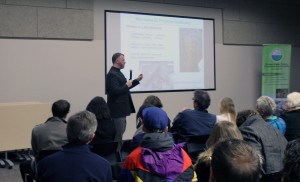Plastic contaminants in the Great Lakes

Paul Helm speaks to an audience at the Ojibway Nature Centre on the cause and concern of micro plastics in the Great Lakes. (Photo by Josh Teixeira)
By Ashley Ann Mentley
Washing your face and hands and brushing your teeth could be contributing to contamination of the Great Lakes.
Of the five Great Lakes, Lake Erie has the highest concentration of micro plastic contamination – and research has only just begun said Paul Helm, a senior research scientist at the Ontario Ministry of the Environment and Climate Change office. He spoke Nov. 12 at the Ojibway Nature Centre as a part of the Green Speaker Series hosted by the Windsor Essex County Environmental Committee.
Helm addressed the issue of visible plastic contaminants, otherwise known as micro plastics, which are smaller than five millimetres in diameter, in the Great Lakes. Helm said one of the biggest issues is how little is actually known about the micro plastics.
“Other than one study collecting it on water in the Great Lakes and another having some pellets wash up on beaches, we haven’t actually done very much yet,” Helm said. “We don’t know the scope and scale of the problem.”
What is known, however, are some of the sources of these small, yet visible pieces of plastic. The primary source is micro beads, which come from exfoliating skincare products such as face wash, hand soap and toothpaste. Helm said other sources may be items like synthetic fibres from clothing, fishing lines, plastic bottles, litter and debris.
“These things that wash our face and help us look pretty are having a huge impact on the
Great Lakes,” Helm said.
Sherry Bondy, Ward 4 councillor in the Town of Essex, addressed what she called “a disconnect” between Essex County towns and the Great Lakes and St. Lawrence Cities Initiative, the organization responsible for conducting the research.
“As a councillor in the county, and my family lives on Lake Erie, I’m surprised how disconnected the local municipalities are to the Great Lakes and how disconnected their elected officials are to the Great Lakes (and St. Lawrence Cities) Initiative,” Body said. It’s kind of upsetting.”
Various locations in the U.S. such as Illinois, New Jersey and New York have begun to introduce legislation that will require companies using micro beads to remove them from their products. Helm said the argument is that micro beads are present in the Great Lakes and they’re coming from products that don’t need to be there.
“As a result of that kind of public awareness and advocacy, the industry has said, ‘You’re right, we can find alternatives,’ and so many of the companies have committed to removing them from the products starting in January 2015,” Helm said.
Ontario has yet to create such legislation.
Stefan Grigorakis is studying micro plastics for his master’s degree at the University of Windsor. He agreed with Helm that one of the biggest obstacles is how little is currently known about the topic.
“There’s only been a handful of fresh water studies of micro plastics and all of those have been pretty much quantifying how much is in the water…” as opposed to looking into sources or effects, Griogorakis said. He is more interested in researching the effects of chemical build up and how to remove the micro plastics, whereas Helm’s studies are focusing largely on the sources of the plastics.
“We don’t really see the micro beads, but we’ve heard a lot about them,” Helm said. “It’s easy to show that these things are there, it’s not so easy to show what kind of effects there are. It’s very difficult to make claims that it’s having a huge impact at this point.”
Helm said this current lack of information about the contaminants and the potential effects should not stop people from taking the issue seriously and acting responsibly.


